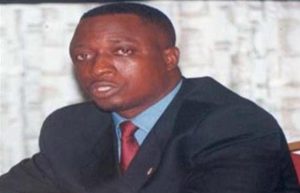By Dawda Faye
Justice Ebrima Jaiteh of the High Court in Banjul on 15 July, 2019, denied Yankuba Touray bail. This followed the application made by his counsel, Abdoulie Sissoho, to grant him bail. He stated that the law is very clear on the points that matter to be taken into consideration or whether or not to grant bail.

The learned judge explained that these are: the nature of the charge, the severity of the punishment, the quality of the evidence available, likelihood of the accused jumping bail or interfering with witnesses, the criminal record of the accused if any and the likelihood of a repetition of the offence if granted bail.
Justice Jaiteh adduced that Section 99(1) of the CPC undoubtedly gives the court the discretion to grant bail to any person other than a person accused of an offence punishable with death or imprisonment for life. He subsequently pronounced that Yankyba Touray shall not be admitted to bail because he was charged with murder. He dismissed the application made by his counsel to be granted bail.
On the adjournment of the case, he said that the law that governs postponement or adjournment of proceedings in the High Court is Section 226 of the CPC. In this jurisdiction, he stated that the power of adjournment by the court is a matter within the discretion of the court.
“From the import of Section 226 of the CPC, the court has the power to grant an adjournment on the grounds that witnesses are absent or any other reasonable cause in the proceedings if the court considers it necessary or advisable to postpone the commencement of any trial,” he told the court. He declared that the court shall not preside over the matter in the summer recess.
He noted that whether the High Court should refer the case to the Supreme Court for interpretation was premised on the accused plea of constitutional immunity, which in the opinion of the Attorney General was a challenge to the jurisdiction of the court to hear and determine the case. He went on to say that the law that governs the referral of matters to the Supreme Court for interpretation is Section 127(1) and (2) of the 1997 Constitution.
He disclosed that the court has a mandatory obligation to stay any proceedings and refer any question to the Supreme Court for determination. He further said that it must be noted that in order to invoke the original jurisdiction of the Supreme Court under Section 127 of the 1997 Constitution, certain conditions must be fulfilled, such as the interpretation or enforcement of certain provisions of the 1997 Constitution.
He adduced that the question that begs an answer is whether the conditions stipulated in Section 127(1) are fulfilled to warrant the court to make referral to the Supreme Court for determination. “The accused is charged with murder and pleaded constitutional immunity without making reference to any section or provision of the 1997 Constitution. It is very unclear to the court what sort of immunity the accused person is claiming and the court cannot speculate as to what sort of immunity he claims and under which section or provision of the constitution,” he stated.
He quizzed which provision of the law would be referred to the Supreme Court for interpretation, adding that the accused person by merely stating to the court that he claims constitutional immunity was not sufficient in law to warrant the court to make a referral to the Supreme Court. He held that if the accused was interested in raising constitutional immunity, he must come formally before the court or has the liberty to file an originating suit to the Supreme Court directly for interpretation.
He disclosed that the accused was charged with murder and the court has the jurisdiction to hear and determine murder cases. He pronounced that the court shall not make a referral of the case to the Supreme Court for interpretation.
The case was adjourned to 14 October, 2019, for hearing.
